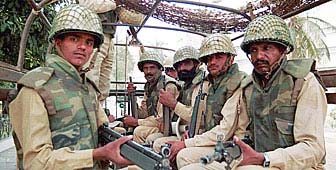
World leaders back military strikes

Most world leaders have supported the strikes by the United States and Britain against Afghanistan, but the attacks sparked protests in several Muslim countries.
The European Union, China, Japan, South Korea, Russia, Pakistan, India and a number of other countries all endorsed the missile attacks and air raids on the Afghan capital, Kabul, and other targets.
France, Canada, Australia, Italy and Germany have all agreed to President George W Bush’s request to contribute forces. Others have granted air transit or landing rights, or are providing military intelligence to help with the US-led global war against terrorism, Bush said.
In the first official assessment of the attacks, which were launched on Sunday, British Defence Secretary Geoff Hoon said 30 targets had been hit, ranging from military installations to terrorist training camps. “Neither the Afghan civilian population nor their homes or property have been targeted,” he said.
Earlier, British Foreign Secretary Jack Straw warned that military action is likely to continue for weeks.
In a joint statement, the EU’s 15 foreign ministers declared their “wholehearted support” for the action being taken and called for a new “representative” Afghan government to replace the ruling Taliban movement.
The EU said the Taliban was paying the price for its refusal to hand over the suspected terrorist, Osama bin Laden, and his al-Qaeda terrorist network, which are accused of carrying out the September 11 suicide attacks in New York and Washington.
Carefully targeted action
“The al-Qaeda network and the regime which supports and harbours it are now facing the consequences of their action,” the EU statement said. Ministers insisted that the “carefully targeted action” was not an attack on Islam or the Afghan people.
In Switzerland, the foreign minister, Joseph Deiss, repeated his support for the US and British attacks but urged the allies not to ignore the plight of the civilian population in Afghanistan.
“We have always considered that large scale terrorism demands a determined and targeted response to prevent other more serious terrorist attacks,” he said in a Swiss television interview.
The foreign ministry added that Switzerland would work closely with its European neighbours to ensure that humanitarian aid was available to refugees fleeing the crisis.
“Intervention, whether short- or long-term, will do severe damage to the civilian population. We have already seen huge flows of refugees leaving the country,” said Daniela Stoffel, a spokeswoman for the ministry. “We are very well aware of an imminent humanitarian catastrophe.”
A warning for Swiss nationals to stay out of Afghanistan has, since the US strikes, been extended to Pakistan and Tajikistan.
Security increased in Switzerland
In a further development, the justice ministry announced that security was being stepped up at a number of foreign embassies and other potential targets such as synagogues and US businesses.
Meanwhile, the strikes against Afghanistan have sparked protests by Muslims around the world. In Pakistan, where some religious leaders called for a holy war, thousands of people attended anti-US protests in the cities of Karachi, Quetta and Peshawar.
The Taliban ambassador to Pakistan, Mullah Abdul Salam Zaeef, told reporters that bin Laden and the Taliban’s supreme leader, Mullah Mohammed Omar, were both alive after the first wave of strikes.
He warned that the action would only serve to unite Afghans against the United States and its allies. “This attack by America is a terrorist act,” he said.
In Asia, radical Indonesian Muslims threatened to hunt down foreigners and the US, British and Australian embassies urged their nationals to stay indoors. The US government has issued a worldwide warning of possible “strong anti-American sentiment and retaliatory actions against US citizens and interests”.
Meanwhile Washington said it had airdropped 37,500 food packets, medicine and other humanitarian supplies to starving Afghans. Defence Secretary Donald Rumsfeld said planes had also dropped leaflets and made radio broadcasts to explain the air and missile strikes.
swissinfo with agencies

In compliance with the JTI standards
More: SWI swissinfo.ch certified by the Journalism Trust Initiative

























You can find an overview of ongoing debates with our journalists here . Please join us!
If you want to start a conversation about a topic raised in this article or want to report factual errors, email us at english@swissinfo.ch.